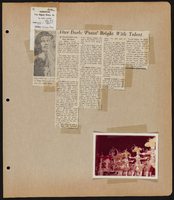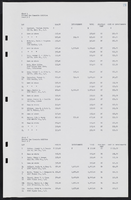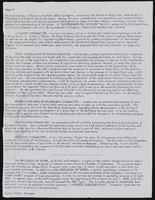Search the Special Collections and Archives Portal
Search Results
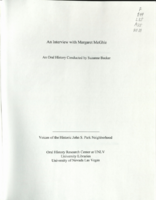
Transcript of interview with Margaret McGhie by Suzanne Becker, November 21, 2008
Date
Archival Collection
Description
Margaret McGhie was a Depression era child who grew up in western Nevada, where her grandparents were ranchers. Her mother, a native Nevadan, married an Italian immigrant, and she recalls moving a lot. Margaret attended a business college in Reno and eventually moved to Las Vegas, where she worked for Basic Magnesium (BMI) in Gabbs, NV and then later for a remanufacturing company where she verified rocket measurements. Only 16,000 people resided in Las Vegas in post World War II days when she moved there for work as her husband returned from military service. At the time lots for homes were selling in the new development of John S. Park. Using the GI bill the young couple became one of the first home owners on the street. The land had formerly been a ranch and orchard making it a beautiful spot. Due to post-war building material shortages it took nearly two years to finish the house construction. To this day Margaret lives in the home where she and husband raised four children. She recalls the neighborhood fondly and describes some of the activities that kept them busy, where they shopped, and how her children attended John S. Park Elementary School and then the local parochial schools. She describes how the town changed from a 10-minute cross-town drive and how the fact of living close to the Strip had little impact on their life. People moved from the neighborhood as the city grew, she says, moving to newer and nicer homes in Spanish Oaks and then Summerlin. The John S. Park neighborhood has changed from a formerly large Mormon demographic to a notable increase of Latino population. She sees the historic designation as a signal of pride in ownership for residents.
Text

Transcript of interview with Ferren W. Bunker by Debra Leu, July 02, 1975
Date
Archival Collection
Description
Text
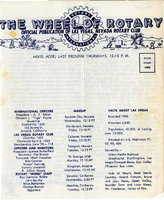
The Wheel of Rotary Las Vegas Rotary Club newsletter, October 20, 1955
Date
Archival Collection
Description
Text
Denton, Hazel Baker, 1887-1962
Hazel Baker Denton (1887-1962) was a prolific writer, educator, active community member, and elected to serve the Nevada State Assembly in the early 1950s.
Person

Los Angeles & Salt Lake Railroad Company standard signal maintainers & pumpers house: architectural drawing
Date
Archival Collection
Description
From Union Pacific Railroad Collection (MS-00397). The scales are noted in the drawing. The bottom corner says, "Union Pacific System L.A. & S.L.R.R. Standard Signal Maintainers & Pumpers House. Locations East Of Caliente. Ass't. Chief Engineers Office Los Angeles. Drawn By F.W.G. Traced By F.W.G. Checked By W.V.L-B. Date. Nov. 24. 1926. Scales As Noted. Revised. Drawing. No. 15656-B".
Image
Sadovich, Maryellen Vallier
Maryellen Vallier Sadovich (1926-2011) was a journalist and charter member of the Southern Nevada Historical Society. She was the Society's research secretary from 1964 to 1969 and was instrumental in uncovering the historical significance of the Spring Mountain Ranch, which led to the establishment of the Spring Mountain Ranch State Park. She wrote two books about Southern Nevada: Guide to Southern Nevada (1976) andThe Mysterious Valley Caliente, Nevada (2000). In addition, she also co-authored several other books about early Nevada.
Person

